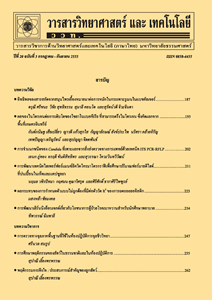ผลของโปรแกรมการสร้างเสริมสมรรถนะการเลี้ยงลูกด้วยนมแม่กับการมีส่วนร่วมของครอบครัวต่อการเปลี่ยนแปลงน้ำหนักตัวของทารกคลอดก่อนกำหนดและความต่อเนื่องในการเลี้ยงลูกด้วยนมแม่
Main Article Content
Abstract
Abstract
This research aimed to study the effect of program enhancing self-efficacy in breastfeeding. The sample was collected 30 dyads of mothers and preterm infants. The experimental group received the program enhancing self-efficacy in breastfeeding with family’s participation and the control group received the routine nursing care. The research instruments used program enhancing self-efficacy in breastfeeding with family’s participation, breast milk expression and collection equipment, breastfeeding logs and growth chart for preterm infant. Data was analyzed by One-way ANOVA. The result was found the weight gain of preterm infants in the experimental group was statistically significantly higher than those of control group [F (3,56) = 11.525, p < 0.001]. When compare between the subgroup of preterm infants were found the weight gain of moderate preterm infants (32-33 weeks) in both groups were no significant, but the weight gain of late preterm infants (34-37 weeks) in experimental group was statistically significantly higher than those the control group (p < 0.05). While the duration of breastfeeding was analyzed by using independent t-test. The result was found the duration of breastfeeding in the experimental group ( = 56.00 day, S.D. = 5.930) was found statistically significant longer than control group ( = 46.43 day, S.D. = 8.186) (p < 0.001). These finding result showed that the family’s participation with a breast-feeding self-efficacy program might improve the continuation of breastfeeding and promote the weight gain of late preterm infants.
Keywords: self-efficacy; family’s participation; preterm infant; breastfeeding
Article Details
References
[2] World Health Organization, World Health Statistics 2013, Available Source: http:// www.who.int/gho/publications/world_health_statistics, July18, 2018.
[3] Ericson, J., Flacking, R., Hellström-Westas, L. and Eriksson, M., 2016, Changes in the prevalence of breast feeding in preterm infants discharged from neonatal units: A register study over 10 years, BMJ Open 6(12): 1-9.
[4] Blencowe, H.C., Simon, C.D., Oestergaard, M.S., Lale, M. and Ann-Beth, L.J., 2013, Born Too Soon: The global epidemiology of 15 million preterm births, Reprod. Health 10: S2-S2.
[5] Melo, D.J., Souza, R.D., Emilia, I. and Cristiane, D.P., 2014, The voice of the woman-mother of a premature baby in the neonatal unit: a phenomenological approach, Braz. J. Nurs. 13: 194-202.
[6] Hay, J. and William, W., 2005, Nutritional requirements of the very preterm infant, Acta Peadiatr. 94: 37-46.
[7] Bandura, A., 1977, Self-efficacy: oward a unifying theory of behavioral change, Psychol. Rev. 84: 191-215.
[8] ชูใจ อธิเบญญากุล, พรรณรัตน์ แสงเพิ่ม, ทัศนี ประสบกิตติคุณ, โสภาพรรณ เงินฉ่ำ, 2560, ผลของโปรแกรมส่งเสริมการรับรู้สมรรถนะแห่งตนต่อการรับรู้สมรรถนะตนเอง ประสิทธิภาพการให้นมทารกและอัตราการเลี้ยงลูกด้วยนมแม่อย่างเดียวของมารดาทารกคลอดก่อนกำหนดระยะท้าย, ว.พยาบาลศาสตร์ 35: 23-35.
[9] พัชรพร รัตนสงคราม, 2551, ปัจจัยทำนายพฤติ กรรมการบีบเก็บน้ำนมในมารดาที่มีทารกคลอดก่อนกำหนด, วิทยานิพนธ์ปริญญาโท, จุฬาลงกรณ์มหาวิทยาลัย, กรุงเทพฯ.
[10] พัชรพร รัตนสงคราม, 2555, พฤติกรรมการบีบเก็บน้ำนมในมารดาที่มีทารกคลอดก่อนกำหนด, ว.วิทยาศาสตร์และเทคโนโลยี 20: 405-415.
[11] Schepp, K.G. and Pai, J., 1995, Psychometric Assessment of the Prefer Participation Scale for Parent of Hospitalized Children, University of Washington, Washington, D.C.
[12] สุธาภินันท์ พรเลิศทวีกุล, ทัศนี ประสบกิตติคุณ และพรรณรัตน์ แสงเพิ่ม, 2556, ปัจจัยที่มีความสัมพันธ์กับการมีส่วนร่วมของมารดาในการดูแลทารกแรกคลอดที่เข้ารับการรักษาในโรงพยาบาล, ว.พยาบาลศาสตร์ 31: 56-59.
[13] Faul, F., Erdfelder, E., Lang, A. and Buchner, A., 2007, G*Power 3: A flexible statistical power analysis program for the social, behavioral, and biomedical sciences, Behav. Res. Methods 39: 175-191.
[14] ณัฐนิชา ศรีละมัย และนฤมล ธีระรังสิกุล, 2558, ผลของโปรแกรมส่งเสริมการรับรู้ความสามารถตนเองของมารดาในการดูแลทารกคลอดก่อนกำหนด, ว.การพยาบาลและการศึกษา 8: 83-94.
[15] Spatz, D.L., 2013, Ten steps for promoting and protecting breastfeeding for vulnerable infants, JPNN. 18: 385-396.
[16] Fenton, T.R., 2003, A new growth chart for preterm babies: Babson and Benda's chart updated with recent data and a new format, BMC Pediatr. 3: 13.
[17] พิมพ์ชนก บุญเฉลิม, ทัศนี ประสบกิตติคุณ, พรรณรัตน์ แสงเพิ่ม และวาสิตา จิรสกุลเดช, 2555, ผลของโปรแกรมการเตรียมความพร้อมมารดาและทารกคลอดก่อนกำหนดต่อการรับรู้สมรรถนะของตนเองในการเลี้ยงลูกด้วยนมแม่และประสิทธิภาพการดูดนม, ว.พยาบาลศาสตร์ 30: 61-71.
[18] Thiele, N., KnierimI, N. and Mader, S., 2016, Parents as partners in care: Seven quiding principles to ease the collaboration, Newborn Infant Nurs. Rev. 16: 66-68.
[19] สมสิริ รุ่งอมรรัตน์, วรานุช กาญจนเวนิช และอุทุมพร ม่วงอยู่, 2012, การมีส่วนร่วมของมารดาในการดูแลทารกคลอดก่อนกำหนดและต้องได้รับเครื่องช่วยหายใจ, ว.พยาบาลศาสตร์ 30: 49-60.
[20] Koa, W., Roslyn, N.B., Matthew, R.S. and Paul, 2014, Parenting and prematurity: understanding parent experience and preferences for support, J. Child Fam. Stud. 23: 1050-1061.
[21] Namprom, N., Picheansathian, W., Jintrawet, U. and Chotibang, J., 2018, The effect of maternal participation in preterm care and improved short-term growth and neurodevelopment outcomes, J. Neonat. Nurs. 24: 196-202.
[22] เสาวลักษณ์ ค้าของ และมยุรี นิรัติธราดร, 2560, ผลของโปรแกรมการรับรู้สมรรถนะแห่งตนต่อพฤติกรรมการเลี้ยงลูกด้วยนมแม่ของมารดาวัยรุ่นในชุมชน, ว.สาธารณสุขศาสตร์ 47: 31-43.
[23] Wang, L.H., Jun, L. and Fei, S.L., 2018, Perceived needs of parents of premature infants in NICU, West J. Nurs. Res. 40: 688-700.


